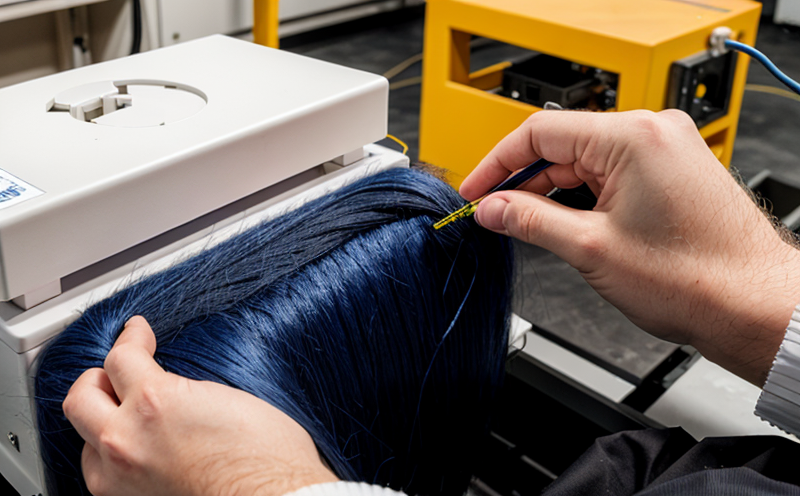DIN 54320 Determination of Fiber Mixture in Textile Yarns
The DIN 54320 standard is a crucial procedure used to identify and quantify the fiber composition within textile yarns. This method helps ensure that products meet quality standards, comply with regulations, and satisfy customer expectations regarding raw material specifications.
Textile yarns are complex mixtures of fibers that can include natural or synthetic materials such as cotton, wool, polyester, nylon, etc. Understanding the exact fiber composition is vital for several reasons:
- Quality Control: Ensures uniformity in product quality.
- Regulatory Compliance: Helps meet industry-specific standards and certifications.
- R&D Innovation: Facilitates the development of new textile blends with desired properties.
- Customer Satisfaction: Guarantees that products delivered match the advertised specifications.
The DIN 54320 method involves several key steps, including specimen preparation, dissolution in a specific solvent, filtration, and analysis using infrared spectroscopy (FTIR). This technique allows for accurate identification of different fibers based on their unique chemical signatures. The process is robust enough to handle both small and large quantities of yarn samples.
For quality managers and compliance officers, this service ensures that their products are consistently high-quality and meet all necessary regulatory requirements. For R&D engineers, it provides critical data for optimizing textile formulations. Procurement professionals can use the results to verify supplier claims about fiber content in incoming materials.
The standard is widely recognized and accepted globally, making it a valuable tool for businesses operating across different markets. By leveraging DIN 54320, companies can enhance their reputation as reliable suppliers of quality textiles.
It's important to note that while the method itself is standardized, its successful application depends heavily on proper specimen preparation. Specimens must be representative of the entire batch and free from contamination or damage during handling. Incorrectly prepared samples could lead to inaccurate results, which would undermine trust in compliance efforts.
The instrumentation used for this test is sophisticated yet user-friendly. FTIR spectrometers provide precise measurements that are essential for distinguishing between various types of fibers. These devices generate detailed spectra that technicians can analyze to determine the exact composition of each sample.
Once testing is complete, analysts produce comprehensive reports detailing the findings. These documents typically include a breakdown of all detected fibers along with their respective percentages within the yarn mixture. Reporting ensures transparency and facilitates easy tracking of results for future reference or audits.
In summary, implementing DIN 54320 in your workflow allows you to maintain strict control over fiber composition throughout production processes. This not only enhances overall product quality but also strengthens compliance with international standards.
Why It Matters
The accuracy and reliability of fiber identification are paramount for maintaining high-quality textile products. Inadequate or incorrect identification can lead to significant issues down the line, affecting everything from manufacturing efficiency to consumer satisfaction.
One critical aspect where proper fiber identification matters most is in ensuring consistent quality across batches. Textile yarns consist of multiple types of fibers that interact during processing and final use. If there's a discrepancy between expected and actual compositions, variations in physical properties like strength or elasticity may arise, impacting product performance.
Compliance with industry standards becomes even more critical when dealing with international trade. Many countries have stringent regulations governing textile products' raw material content. Non-compliance can result in costly penalties, reputational damage, and potential market withdrawal.
R&D teams benefit greatly from precise fiber composition analysis as it informs decisions about which combinations of fibers yield the best performance characteristics for specific applications. For example, blending certain percentages of synthetic vs natural fibers might optimize durability while reducing cost or weight.
Lastly, consumers increasingly demand transparency regarding product ingredients and sustainability practices. Providing accurate information about your products' fiber contents is essential to building customer trust and loyalty.
Benefits
Implementing DIN 54320 in your textile testing protocols offers numerous advantages:
- Precision Identification: Accurate identification of all fibers present in the yarn mixture.
- Consistency Assurance: Ensures that each batch meets predefined quality standards.
- Regulatory Compliance: Meets international and national regulations regarding raw material specifications.
- Innovation Support: Provides valuable data for developing new textile blends with enhanced properties.
- Supplier Verification: Allows you to verify supplier claims about fiber content in incoming materials.
- Consumer Trust: By providing accurate information, it fosters trust and loyalty among customers.
- Efficiency Improvement: Reduces rework and waste by identifying problems early in the production process.
- Ethical Manufacturing: Ensures that only ethical sources are used for fiber components.
The combination of these benefits contributes to a more efficient, compliant, innovative, and transparent textile manufacturing environment.
Eurolab Advantages
At Eurolab, we pride ourselves on delivering exceptional service in fiber identification using DIN 54320. Our team of experienced technicians ensures that every test is conducted meticulously according to the standard's stringent requirements.
- State-of-the-Art Equipment: Utilizing cutting-edge FTIR spectrometers for precise measurements.
- Experienced Staff: Our analysts have extensive experience interpreting complex spectra and providing accurate interpretations.
- Comprehensive Reporting: Detailed reports that not only list the detected fibers but also provide insights into potential quality impacts.
- Prompt Turnaround Times: Efficient processing ensures timely delivery of results to meet your schedule demands.
- Certified Compliance: Eurolab is accredited to conduct tests according to DIN 54320, ensuring adherence to international standards.
- Custom Solutions: Tailoring our services to suit the unique needs and challenges of different clients.
- Client Support: Offering guidance throughout the testing process, from specimen preparation to result interpretation.
- Continuous Improvement: Regularly updating our methods and equipment to stay at the forefront of textile analysis technology.
Partnering with Eurolab means gaining access to world-class expertise in fiber identification without compromising on cost or convenience. Our commitment is reflected in every aspect of our service, from initial consultation to final report delivery.





